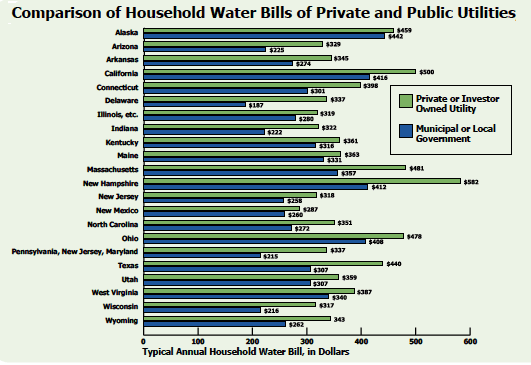Because water supply is a natural monopoly, it is not surprising to find that water privatisation is accompanied by price rises since it means that those companies have power through their control of an essential service. In France, private water companies have consistently charged higher prices than municipal authorities. In 2004 the difference was 29 percent and much of that difference could be attributed to private ownership.
 Private water companies have made huge profits in developed nations. In the UK, prices rose 245% in 17 years, while operating costs remained steady, mostly due to the increasing cost of capital charges, interest and profits. During that time there is no evidence of improvements in performance, productivity or efficiency. Although prices have been regulated by the government water authority, Ofwat, "companies have every incentive to mislead the regulator, by exaggerating the capital expenditure necessary – then they get allowed to charge higher prices, but the real expenditure is lower, and so they can pocket the difference as increased profit."
Private water companies have made huge profits in developed nations. In the UK, prices rose 245% in 17 years, while operating costs remained steady, mostly due to the increasing cost of capital charges, interest and profits. During that time there is no evidence of improvements in performance, productivity or efficiency. Although prices have been regulated by the government water authority, Ofwat, "companies have every incentive to mislead the regulator, by exaggerating the capital expenditure necessary – then they get allowed to charge higher prices, but the real expenditure is lower, and so they can pocket the difference as increased profit."
Between 1989 and 1995, when water rates in England were doubling, the profit margins for the private water companies increased six fold. Water disconnections of those unable to pay their rates tripled between 1991 and 1992 after privatisation. Then prepayment water meters were installed in the homes of the poor so that people effectively cut themselves off if they couldn’t pay.
However, in developing nations where consumers are far less able to pay higher rates for water, many private water ventures have failed because private companies "have been unable to meet obligations to shareholders, to provide a market rate of return and also to meet their obligation to maintain and expand the water system and to provide acceptable quality water at affordable prices".
In Manila, the Philippines, after privatisation, water rates increased by up to 500 percent and when the Philippines currency was devalued and French water company Suez, which owned 40 percent of the water company, was unable to recoup the loss through a further increase in rates it just walked out. It is now suing the Philippines government for $337 million for reimbursement of its losses and has left it with $530 million in debts. Water supply in Manila has mostly been renationalised. Manila had been model privatisation project for the World Bank.
In Jakata, Indonesia, Suez and Thames Water contracts include provision for tariffs to rise every 6 months having already risen by 227 percent in 2005. By 2009 water rates in Jakata were already the highest of Southeast Asian cities and the automatic rises had 14 more years to run. Despite this high price, ratepayers often have to buy water because the water in their taps is not fit to drink or has been cut off.
In Cochabamba, Bolivia, the government was pressured by the World Bank to privatise the operating of its water supply so it contracted in 1999 with a consortium of US- based Bechtel and UK-based United Utilities to do it. Water rates soared shortly after the consortium took over and were equivalent to a quarter of the average income in the city. People were told their water would be cut off if they didn’t pay. Under the contract they weren’t even allowed to use private wells without paying the consortium.
based Bechtel and UK-based United Utilities to do it. Water rates soared shortly after the consortium took over and were equivalent to a quarter of the average income in the city. People were told their water would be cut off if they didn’t pay. Under the contract they weren’t even allowed to use private wells without paying the consortium.
The people of Cochabamba demonstrated and protested in the streets for eight days until martial law was declared and troops fired on the crowds killing two and wounding 30 people. However the people succeeded in getting the government to break the contract and take back control of the water supply. The consortium is suing the Bolivian government in a World Bank court for losses from the broken contract.
When La Paz and El Alto, Bolivia, sold their municipal water utility to Suez-Controlled Aguas del Illimani,
 Suez received over US$1million each year for management fees,
Suez received over US$1million each year for management fees, When local people threatened an indefinite civil strik the government cancelled the contract.
When a Vivendi (now Veolia) led consortium was awarded the water supply contract in Tucuman, the poorest province in Argentina, in 1994, it included provision for a 95% increase in rates in the first year and further increases in subsequent years. In 1996 the unaffordable price rises led to a payment boycott that hurt the company's finances.
In September 1997 the Vivendi consortium notified the provincial authorities that it was rescinding the contract claiming that it was owed US$250 million by the province. The regulatory authority responded that the company would have to pay fines amounting to several million for water quality failures and contractual non-compliance. The governor demanded that the Vivendi consortium continue operating the water and sewer services for 18 months or until a new operator could be found.
In 2000, after the Argentinian government had spent millions in legal fees, the ICSID found against Vivendi because it had breached its contract. However the company appealed the decision, this time claiming US$357 million.
In Antalya, Turkey Suez was awarded the contract for water supply in 1996 after water privatisation was imposed by the World Bank as a loan condition. When the minicipal council refused to agree to Suez demands for water prices to be doubled and sewerage prices to be increased by 10 times, Suez declared bankruptcy and terminated the contract. After the water supply was taken over by the municipal authorities prices actually declined slightly.
In North Brunswick, New Jersey privatisation of their water in 1996 caused household bills to double and triple. In 2002 the town bought out United Water's water supply contract to save money and in 2006 it terminated the company's sewerage contract for the same reason. In Houston, Texas the city expected to save $2 million each year by taking over the running of its sewage treatment plant from United Water. In Fairfield-Suisun, California, independent consultants foudn that publlic operation of the sewarege sysetm would save 10 to 15 percent of operating costs.
In fact, throughout the US both water is supplied for lower rates by public utlities than by private companies (see graph below). According to Food and Water Watch:

The same is true for sewerage treatment. Food and Water Watch noted:
A study of the construction of 35 wastewater treatment plants found that “privatization is associated with higher costs in wastewater treatment,” and that “choosing the privatization option is more costly than going with the traditional municipally owned and operated facility.”
When the regional water authorities (RWAs) in England were sold off in 1988 they received massive government subsidies including:
Even so, “prices rose by over 50% in the first 4 years. The first 9 years produced price increases of 46% in real terms (adjusted for inflation).” This enabled the water companies to make extraordinary profits over the next few years and they were soon purchased by the large transnational water companies including Suez, Vivendi and RWE.
As prices rose, the number of people disconnected from the water supply for non-payment also rose, endangering public health and causing a rise in rates of dysentry. The rate of disconnections after privatisation tripled in the first five years. After an outcry water companies installed pre-payment water meters in homes where water payments were behind (16,000 by 1996). In 1999, as a result of public protest, water disconnections and pre-payment meters were banned.
The universal experience of water privatisation in the UK was a sharp increase in the cost of water. In cash terms, the average annual bill for water and sewerage rose from £120 per year in 1989 to £294 in 2006, an increase of 245 per cent in 17 years... The trend in price variations seems to be continuing. ‘The average household bill in 2007/08 is £312 for water and sewerage. This is a real terms increase of 42% since privatisation in 1989’.
The water supply and sewerage system in Pakura is supplied by the publicly-owned Watercare, which provides bulk drinking water and treats waste water, and the privately-owned retailer, United Water, a joint venture of Vivendi (now Veolia), Thames Water, and Kinhill Engineers (5%). Between 1998 and 2004 while Watercare's charges increased by 21%, United Waters's increased by 144%.